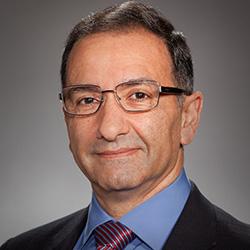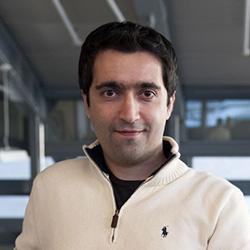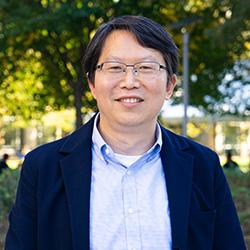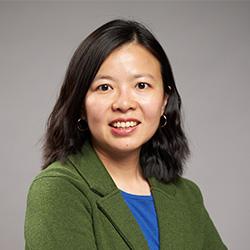Panel members:
- Ahmad Bahai - CTO Texas Instruments Corp. and Professor of the Practice EECS MIT
- Sertac Karaman - Director Lab for Information and Decision Systems MIT
- Andy Wang - CEO Prescient Devices
- Carole-Jean Wu - Research Scientist and Technical Lead Manager at Meta
Will Cloud or Edge Computing Dominate over the Next 10 Years?
Moderator: Charlie Sodini
The question, “Will Cloud or Edge Computing dominate over the next 10 years?” has been asked by many people from hardware and software designers, to business creators, marketing geniuses, and application creators. The usual answer is, “it depends on the application.” The real question that needs to be answered is, “What are the application spaces where one dominates and what is growth potential of those spaces over time.”
There are constraints that limit cloud computing such as latency and privacy and those that limit edge computing such as cost and complexity. How do these constraints affect the choice between cloud and edge for a given application? For example, Chat GPT is nearly perfect for cloud computing. The communication of the questions sent to the massive cloud computing and the inferences returned are very low bandwidth and in general have little privacy concerns. On the other hand, medical data computation and storage has enormous privacy constraints that makes the use of public clouds difficult such that edge computing tends to win.
This panel is comprised of thought leaders from small and large industries and academia with expertise in edge data solutions, cloud hardware solutions, computer architecture and machine learning. We will discuss the constraints on cloud and edge computing and the possible solutions that are on the technical horizon to mitigate these constraints? We will address current applications and give perspectives on their potential growth over time. Finally, the panel will speculate on disruptive applications that could tip the balance in either direction.
Panelist Bios:

Ahmad Bahai is a senior vice president and chief technology officer (CTO) of Texas Instruments responsible for guiding break-through innovation, corporate research and Kilby Labs.
Dr. Bahai is a Professor of Practice at MIT, IEEE Fellow and a member of Industrial Advisory Committee of Chips Act. He was an Adjunct professor at Stanford University from 2017-2022 and a professor in residence at UC Berkeley from 2001-2010.
Throughout his career, Dr. Bahai has held a number of leadership roles including director of research labs and chief technology officer of National Semiconductor, technical manager of a research group at Bell Laboratories and founder of Algorex, a communication and acoustic IC and system company, which was acquired by National Semiconductor.
He holds a Master of Science in Electrical Engineering from Imperial College, University of London and a doctorate degree in Electrical Engineering from University of California, Berkeley

Sertac Karaman is an Associate Professor of Aeronautics and Astronautics at the Massachusetts Institute of Technology (since Fall 2012). He is the Director of the Laboratory for Information and Decision Systems (LIDS) - interdepartmental research center committed to advancing research and education in the analytical information and decision sciences. He has obtained B.S. degrees in mechanical engineering and in computer engineering from the Istanbul Technical University, Turkey, in 2007; an S.M. degree in mechanical engineering from MIT in 2009; and a Ph.D. degree in electrical engineering and computer science also from MIT in 2012. His research interests lie in the broad areas of robotics and control theory. In particular, he studies the applications of probability theory, stochastic processes, stochastic geometry, formal methods, and optimization for the design and analysis of high-performance cyber-physical systems. The application areas of his research include driverless cars, unmanned aerial vehicles, distributed aerial surveillance systems, air traffic control, certification and verification of control systems sodware, and many others. He delivered the the Robotics: Science and Systems Early Career Spotlight Talk in 2017. He is the recipient of an Amazon Faculty Award in 2020, IEEE Robotics and Automation Society Early Career Award in 2017, an Office of Naval Research Young Investigator Award in 2017, Army Research Office Young Investigator Award in 2015, National Science Foundation Faculty Career Development (CAREER) Award in 2014, AIAA Wright Brothers Graduate Award in 2012, and an NVIDIA Fellowship in 2011. He serves as the technical area chair for the Transactions on Aerospace Electronic Systems for the robotics area, a co-chair of the IEEE Robotics and Automation Society Technical Committee of Algorithms for the Planning and Control of Robot Motion. He serves on the Robotics: Science and Systems (RSS) Foundation Board and acts as the Secretary of the RSS Foundation. He is also co-founder of Optimus Ride, a Boston-based MIT-spinoff startup company that is developing self-driving vehicle technologies to enable accessible, equitable, safe and sustainable mobility for all.

Dr. Andy Wang is the founder & CEO of Prescient Devices, an MIT startup that focuses on transforming unstructured data into business value. Previously Andy was the founder & CTO of GTI IoT Technology, which built lowpower wireless sensor networks for the public and industrial sectors. He received a Ph.D. in Electrical Engineering and Computer Science from the MassachuseZs Ins4tute of Technology.

Carole-Jean Wu is a Research Scientist and Tech Lead Manager at Meta AI. She is a founding member and a Vice President of MLCommons – a non-profit organization that aims to accelerate machine learning for the benefits of all. Prior to Meta/Facebook, she was an Associate Professor at ASU. Dr. Wu’s expertise sits at the intersection of computer architecture and machine learning. She is passionate about pathfinding and tackling system challenges to enable efficient and environmentally-sustainable technologies. Her work has been recognized with several awards, including IEEE Micro Top Picks and ACM/IEEE Best Paper Awards. She received her M.A. and Ph.D. from Princeton and B.Sc. from Cornell.